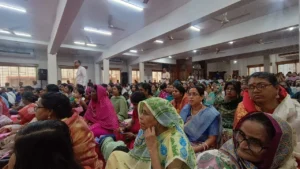
Due to fears of persecution, the annual Easter vigil took place on a smaller scale this year. csi
For decades, religious pluralism and tolerance characterized both state and society in Bangladesh. The secular Awami League government, which was deposed on August 5, 2024, restrained Islamist forces in the country. However, attacks and discrimination were on the rise. Now that the government has fallen, and conservative religious groups are enjoying increased influence, religious minorities are witnessing violence and persecution on a much greater scale.
Hindu, Buddhist, and Christian communities are all experiencing targeted attacks and intimidation. Reports suggest that Islamist extremists, with either direct or covert support from the new authorities, have intensified their efforts to suppress these religious communities.
A flurry of lawsuits
Since the Awami League government fell, hundreds of cases have been filed, accusing thousands of individuals—particularly from minority communities—of various offenses related to the student movement whose protests brought about the government change. These cases have been widely criticized as tools of oppression, weaponizing the legal system against individuals based on their political beliefs and religious identities.
Investigations by multiple sources, including journalists and human rights organizations, have revealed a disturbing trend: many plaintiffs in these legal cases do not even know the names of the accused. Instead, it appears that a group has deliberately included names on these legal complaints, forcing innocent individuals into legal battles.
Moreover, CSI has received reports that some individuals have been contacted by intermediaries who demanded bribes in exchange for removing their names from the lawsuits. Those who refused to pay found their names among those listed as accused in fabricated cases.
Minority leaders targeted
Cases have also been filed against numerous minority leaders across the country, including the general secretary and president of the Bangladesh Hindu Buddhist Christian Unity Council, according to CSI sources. No religious minority has been spared—Hindus, Buddhists, and Christians alike have faced persecution.
Prominent Christian organizations—including the Bangladesh Christian Association, Christian Association Bangladesh, Dhaka Christian Cooperative Credit Union, Dhaka Metropolitan Christian Cooperative Housing Society, YMCA, Bangladesh Baptist Church Association, Church of Bangladesh, and Christian Tribal Welfare Association—have reported that legal charges have been brought against 40 to 50 individuals.
Many of them have been denied bail and are being held in inhumane conditions in overcrowded prisons and with restricted access to legal representation.
Political motives behind attacks, arrests
The interim government insists that the attacks on religious communities over the past months are politically, not religiously, motivated. However, if this claim were true, it would suggest that minorities in Bangladesh support a particular political party—raising important questions about why these communities align themselves with that ideology.
The Christian community, in particular, has faced a concerning pattern of targeted accusations. Most Christians in Bangladesh do not directly engage in politics, yet many support the former ruling party.
While some minority leaders may have political affiliations, political participation is a fundamental right, and no one should face imprisonment or baseless charges simply for supporting a particular ideology.
The recent arrests are being seen as a stark warning to minority communities, discouraging them from any political engagement whatsoever.
Attacks on religious institutions
In addition to the prosecutions, multiple places of worship and Christian institutions have been attacked, looted, and vandalized since the government ouster. The Bangladesh Catholic Church has been particularly affected, with several church-run schools and institutions forced to close due to escalating tensions.
Fearing for the safety of their communities, Christian leaders—including the head of the Catholic Church in Bangladesh, the National Council of Churches, and the National Christian Fellowship—have met with key government officials such as the chief adviser, the home affairs adviser, and the chief of the Army. They have formally expressed their concerns and requested immediate intervention to protect religious minorities.
Every year, Bangladesh’s Christians organize an open-air Easter vigil, attended by thousands. In a sign of the increasing anxiety felt by Christians, this year the event took place in a church compound and, with 2,500 participants, on a much smaller scale than usual.

